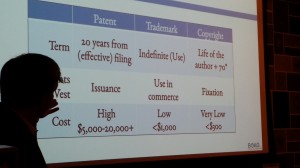How to plan your patent, trademark, copyright and domain names

By Dennis Clemente
At Battery Park in downtown Manhattan last May 14, Andrew Wong’s New York Entrepreneurs Business Network hosted a special talk on how to come up with a strategy for getting patents, trademarks and copyrights as well as getting new domain names.
Guest speaker David Boag presented “The Big Three”: patents, trademarks and copyrights. He runs a boutique intellectual property law practice that focuses on trademark, copyright and technology law.
Patent
Just to give a brief description of a patent, a term that lasts 20 years from filing and must be used upon issuance) is the right to exclude others from making, using, selling or importing the invention.
Trademark
Trademark (indefinite, for use in commerce) is a symbol that identifies and distinguishes the source of the goods of one party from those of others.
Copyright
Copyright is the exclusive right of an author to exploit a work, including making copies, publicly performing the work, and preparing derivative works.
Boag explained The Big Three. For patents, he said you need to identify patent-worthy inventions. The important thing, he said, is for you to aim at not just any patent, but a valuable one. Next thing you can do is file early and be the first to file, and file continuations and adapt. For trademarks, confirm availability early and make sure to be distinctive, as you take care of it, use it correctly and protect it.
The symbol TM is trademark whereas the r symbol means registered.
For copyrights, it is crucial that you register important materials; the source code of the website, for instance; and have registration requirement for infringement claims.
What are some examples of design patents? It can be a shoe design, smartphone, GUI or graphical user interface.
What to keep in mind:
- For patents, file within one year of your first public disclosure; many foreign jurisdictions require “absolute novelty”
- By default, an employee owns work done within the scope of employment; use employment agreements
- Avoid infringement of the right of others; confirm FTO (freedom-to-operate) before starting
- Fair use is not always fair. Limit use for commentary, criticism, parody (look at purpose, amount nature and impact)
Costs
Breaking down the costs for each, patents will set you back $5,000 to $10,000 up; trademark about $1,000; and copyright, about $300.
Boag said problems arise if you don’t do it right. In 2013, there were a total of 302,948 patent issues; 40,000 software patents and 4,701 patent infringement suits, 62 percent bought by NPEs (non-practicing entities). How much does a wrongdoing cost? How does $29 billion in direct costs and litigation costs sound to you?
Boag said seeking patents is expensive and may not be worth it. “It’s a judgment call.” Companies use it to protect early market share. Trademarks, on the other hand, protect your identity and branding. It has national rights and puts others on notice, but requires care and feeding.
Boag said seeking patents is expensive and may not be worth it. “It’s a judgment call.” Companies use it to protect early market share. Trademarks, on the other hand, protect your identity and branding. It has national rights and puts others on notice, but requires care and feeding.
The night’s other speakers were David Mitnick and Howard Greenstein of DomainSkate, a company that focuses on online brand protection. The two talked about the new top-level domain names that you can use for your startup or as investment, as well as issues on cybersquatting and mirror sites.
Mitnick, CEO, said he created Domainskate when he saw the potential in the expansion of the global top level domain space. He also shared his expertise in the area of Domain Law. Greenstein teaches social media in the Masters Program at the Heyman Center for Philanthropy and Fundraising at NYU SCPS. He is currently contributing editor for Inc. Magazine, writing the weekly Startup Toolkit.